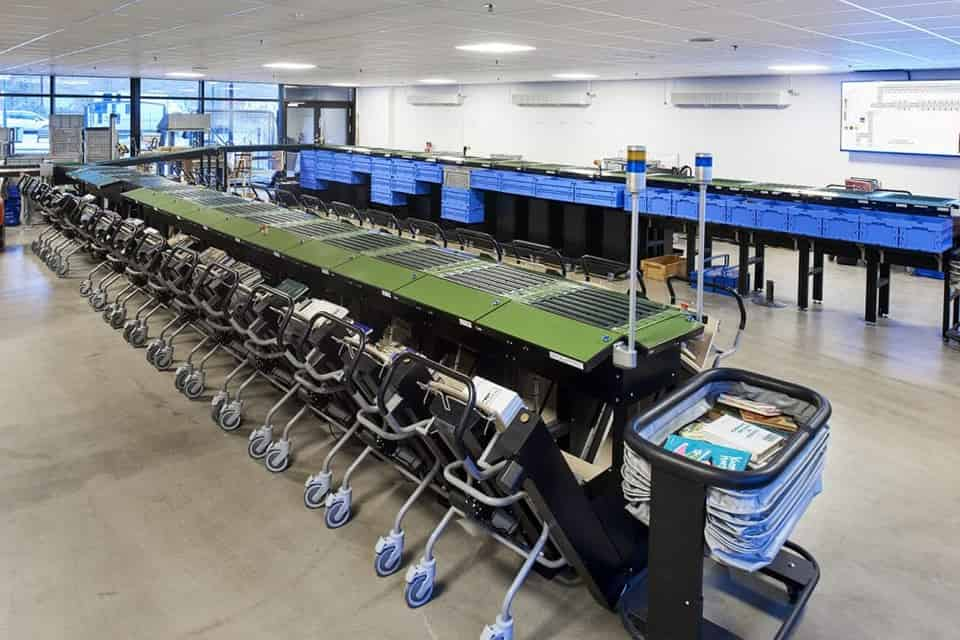Case Story: Libraries in Clackamas County
Lincc’s Switch to an AMH Central Sorting System Made Materials Handling Easier
“We’ve felt very well-supported throughout the design and implementation process. The Lyngsoe central sorter exceeded our expectations and continues to outperform our projections.”
Josh Wolfe, Materials Handling Supervisor

About the Library
Just south of Portland, Oregon, a network of 13 members libraries participate in an informal resource and revenue sharing network called Libraries in Clackamas County (LINCC). Twelve autonomous and independent municipal public libraries, plus one library overseen directly by the County, provide services to patrons of participating city libraries. The LINCC Library Services office oversees the ILS, runs the inter-library delivery program, and offers members other advantages of being part of a consortium. http://lincc.org/
The Challenge
Centralized manual sorting for member libraries lead to inefficient flow of materials
The LINCC Library Services office, while not a library itself, serves as a centralized sorting facility for the 13 member libraries. Patrons borrow freely between libraries, and materials need to be routed back to their owning libraries or moved to fill holds at other locations. When this sorting was manual, member libraries had to maintain separate totes for each of the other member libraries (12 total totes, at minimum); this resulted in many half-filled totes, which had to be re-sorted and combined by the drivers in the delivery trucks during their daily route. In addition, to wear and tear on materials and physical stresses on drivers, this opened a second opportunity for misrouting due to human error.
The Solution
Centralized sorting and automated materials handling
As part of a larger RFID initiative, LINCC chose to implement automated materials handling at its centralized sorting location and added the Lyngsoe Tote Check-in Server™ Software, to extend the benefits of centralized sorting to each library location. A 27 bin Lyngsoe Sort Mate™ system with staff feeds was custom-designed, efficiently using available space while leaving Materials Handling staff enough room for other work. Two of LINCC’s member libraries also took the opportunity to implement AMH systems in their locations, increasing the efficiency of central sorting.
By switching to AMH and implementing a centralized sort, and by giving member libraries the ability to scan in an entire tote of materials with a single click, LINCC saw improvements in efficiency and staff response was overwhelmingly positive. Centralized sort removed the need for staff at member libraries to pre-sort materials; totes are filled to capacity and sorted later, reducing the number of totes picked up at each member library and reducing the number of totes each library needs to store and fill. Drivers are relieved from combining half-full totes in the backs of trucks, reducing their delivery circuit time, removing a touch point and additional wear and tear on materials.
Benefits
Increased efficiency for delivery of materials
- Increased efficiency for delivery service to all member libraries.
- Staff time and sorting space reductions at member libraries, as pre-sorting to 12 destinations is reduced to filling single totes to send to central sorting.
- Tote check-in extends the efficiency to members receiving deliveries, who can scan in an entire tote at once and then send it to be sorted for reshelving.
The Results
Reduced driving and in-motion sorting time by 22%
In the first two months that LINCC has been running their AMH central sorting system, they have seen an estimated 30% decrease in the number of totes needed to move around the system, and drivers on the two delivery routes have reduced driving and in-motion sorting time by 22%.
Josh Wolfe, Materials Handling Supervisor, reports that member libraries have expressed how much easier moving to centralized sorting has made the materials handling aspect of their work.